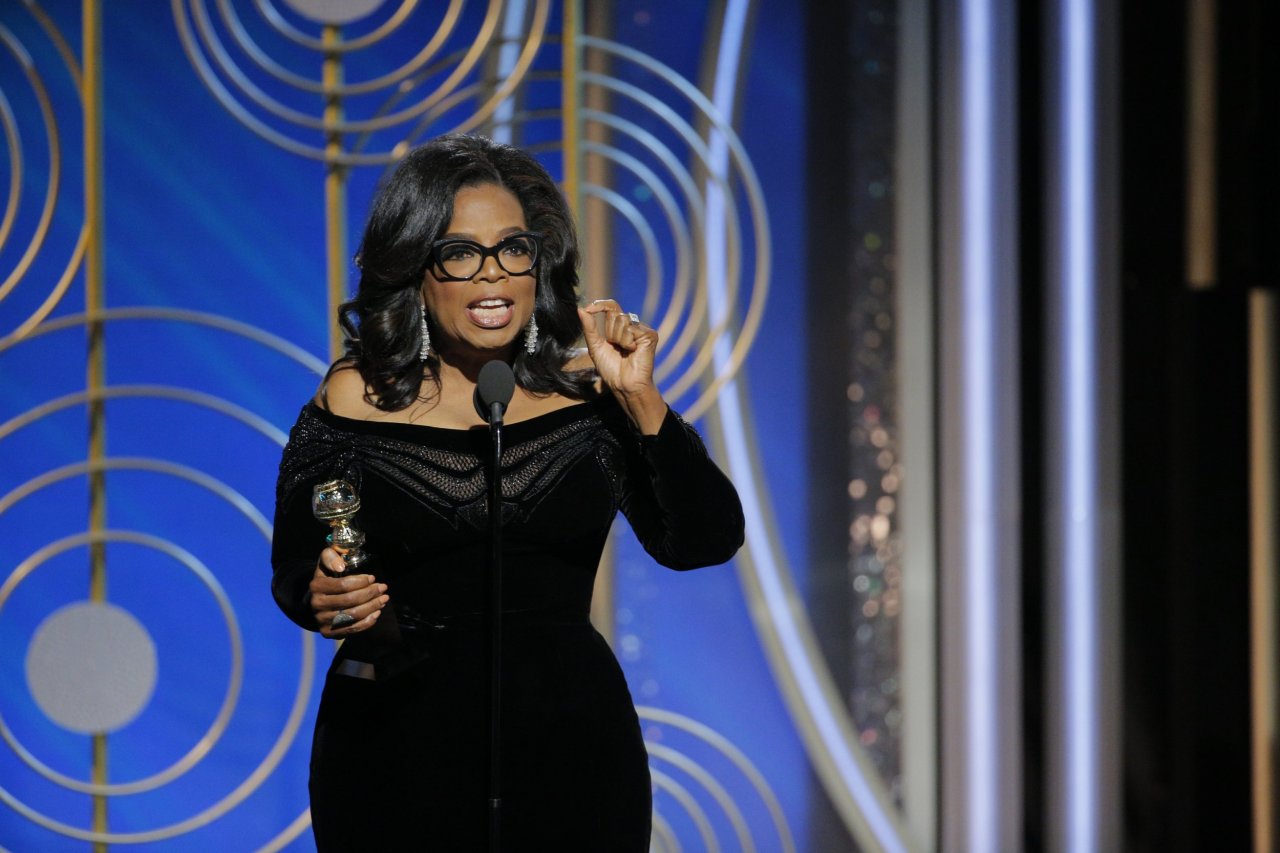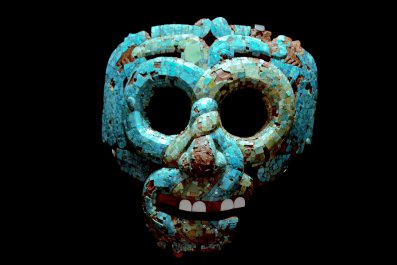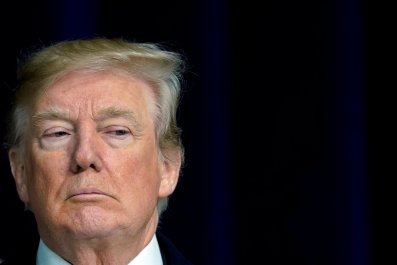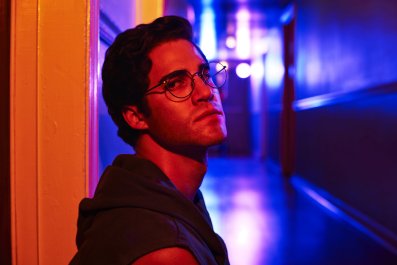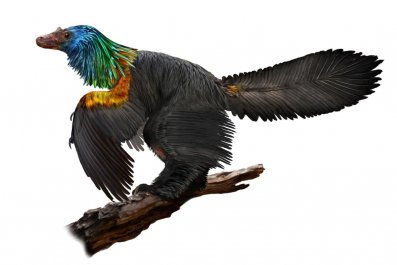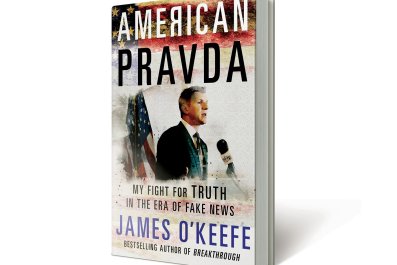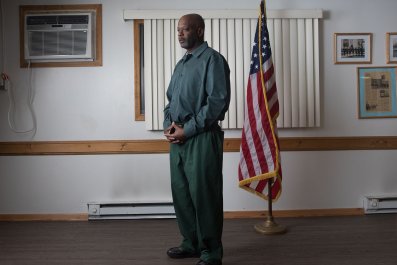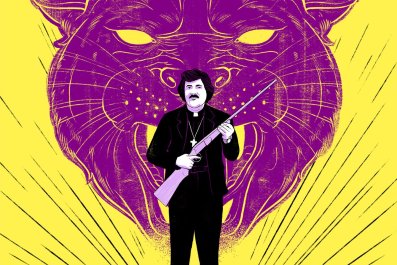Oprah for president.
At first it was a farfetched joke—a distant fantasy. Then, after Trump won in 2016, it didn't seem quite so implausible anymore. And now, in the days following Oprah Winfrey's charged and inspirational speech at the Golden Globes, the prospect is being discussed by Democrats with breathless fervor. Could she beat Trump? Should she run? (Well...) Would she? (The television star has not expressed any campaign plans, though her partner, Stedman Graham, has heightened speculation by saying that "she would absolutely do it.")
After watching the Globes speech, Jeremy Young turned to his wife in a state of vindication: He had been talking about Winfrey's presidential potential for years. Young is a historian who studies charisma in American politics. (His book, The Age of Charisma, examines the rise of charismatic leadership between 1870 and 1940.) In a fascinating tweetstorm, Young argued that Winfrey is the single most charismatic person in America, a rare celebrity who has "the kind of cultural cachet usually reserved for saintly figures such as Mr. Rogers or the Pope." (Even President Obama "seems like a potted plant next to Oprah's star power," Young observed).
First of all, you have to understand that Oprah is almost certainly the most charismatic person in America right now. If she ran for office, she would be the most charismatic American politician since Ronald Reagan.
— Jeremy Young (@jeremycyoung) January 9, 2018
Oprah has the kind of cultural cachet usually reserved for saintly figures such as Mr. Rogers or the Pope. On top of that, she's a trained actress; people forget this, but she won an Oscar in 1986.
— Jeremy Young (@jeremycyoung) January 9, 2018
What this means is that Oprah, like Donald Trump, has a charisma that transcends traditional politics. For instance, there are a lot of white women who voted for Trump, who would usually never vote for a black woman, who LOVE Oprah. They'll vote for her. Her support is real.
— Jeremy Young (@jeremycyoung) January 9, 2018
Young's conclusion: Don't count her out. Winfrey could step into a presidential race and, despite her utter lack of governing experience, immediately become a front-runner.
Newsweek spoke with Young in between classes at Dixie State University, where he teaches, about Winfrey's singular and magnetic charisma and what this could mean for presidential politics.
You've said that Oprah is the most charismatic person in America right now. Can you talk about what you mean by that?
The way I think about charisma is as a relationship between leaders and followers. Charisma is a quality of behavior that a leader has, but it's also a way that followers respond to a leader. I think Oprah is the most charismatic person in America because she has the most devoted following in America.
There's a great book by Kathryn Lofton called Oprah: The Gospel of an Icon. She says that Oprah doesn't make sense if you think of her as a celebrity. She only makes sense if you think of her followers as a religious movement. They're structured like a religious movement. They're organized into clubs. They look at her almost as a quasi-religious figure. There's just no one in America who has that kind of following who would be a remotely plausible presidential candidate, except for Oprah.
In what way do Oprah's followers resemble a religious movement more than a celebrity fandom?
It has to do with Oprah's message, which is one of uplift and self-help and the ability to improve your life through dedicated work on yourself. And followers respond to that. They don't just look at her as a celebrity. They look at her as someone preaching a gospel of good living that inspires them to be better people. While that doesn't have any strictly theological content, it is an almost religious approach to one's life.
What's the relationship between this sort of charisma and political success? Is this a requirement in order to succeed as a political candidate?
It's definitely not a requirement. Throughout American history, the most charismatic candidates have been candidates who had trouble succeeding politically through traditional means.
Both Oprah and Trump would seem to fit into that category. Neither of them have political backgrounds, but they both have large followings that they're able to command.
Trump's is more interesting, in some ways. Trump didn't have this kind of following before he ran for president. There were a lot of people who thought of him as primarily a celebrity. The following didn't develop until he started holding political rallies. Oprah has that following already, just from her work on her talk show and through her media empire.
Where does Trump fit into this. Do you think Trump is the most charismatic president of your lifetime?
No, because I was alive when Ronald Reagan was president—barely. I think Ronald Reagan was more charismatic. Trump is charismatic in terms of the way his followers respond to him and in terms of the way he channels their anger. But I wouldn't describe him as traditionally charismatic. He doesn't give a rousing speech. He speaks in the manner of a reality television star rather than with traditional eloquence. And he doesn't display a particular ability to communicate with voters that's unique except inasmuch as he's reflecting their emotions.
Oprah is a lot more like Reagan in that way. Both of them are trained actors. Both of them are incredibly good at connecting on a human level with ordinary America. That's what charisma is really about: How do voters feel connected to their leaders in a massive, 300-million-person democracy?
Bill Clinton also was and is an extremely charismatic figure. I didn't realize how charismatic he was until I heard him speak in person at a rally. In some ways, he's the modern figure most similar to the people I study in the 1890s, whose charisma involved working a rope line and walking a room.
Obviously, mass media plays a major role in charisma being trasmitted to voters. Your book deals with a time period in which television didn't quite exist yet.
Charisma is both amplified and diminished by mass media. It's amplified in that you can reach more people more quickly and easily than ever before. It's diminished in that it's very difficult to create a direction emotional connection with people who aren't there in person. The first person who really did that effectively was Franklin Roosevelt with the Fireside chats. [People would] listen to the Fireside chats with an empty chair in the living room so they could imagine he was sitting there.
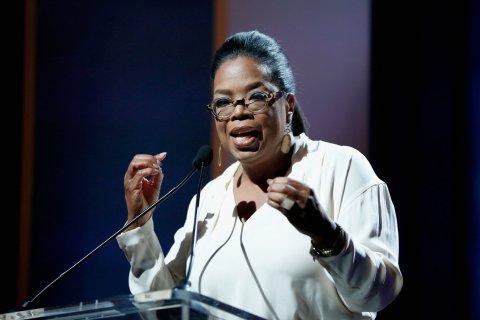
Do you think pundits are failing to take seriously the prospect of Oprah running for president?
I think people haven't taken it seriously before and haven't realized the potential that she had, but they're taking it seriously now. I think pundits have to be careful to take Oprah seriously as a candidate, as someone who can plausibly win, without overfocusing on her just because she's a celebrity.
If she runs, you believe she would definitely win.
No. If she runs, I believe that she definitely can win. She should never be counted out. I think she has the skills that would make her a leading candidate from the second she entered. But there's a lot we don't know about her. We don't know whether she's disciplined enough to raise money. We don't know whether she's capable of formulating a foreign policy platform. I think she's more capable of those things than her detractors think.
When did you first realize that she could be a future president?
The second Donald Trump started leading in the polls in the primary in 2015. My thought was, "Who else is there who could do this?" My first thought was: "Oprah!" I was telling my wife about this last night. I was saying, "All these things I've been telling you for the last two years—I've been talking your ear off about Oprah and how she could be the next president, and now all of a sudden maybe it's happening!" When I started thinking about that question—"Who is a celebrity with the kind of support and the kind of skills that they could step right into a presidential race and become an instant frontrunner in the way that Trump did"—she was the first name that came to mind.
Who are some other celebrities in that category?
Back in the '90s, people talked about Tom Brokaw running as a Republican nominee before the Republican party became too conservative for Brokaw. There aren't really people like that now who have the kind of transcendent cachet as major leaders on news programs. I think Oprah is in a class by herself.
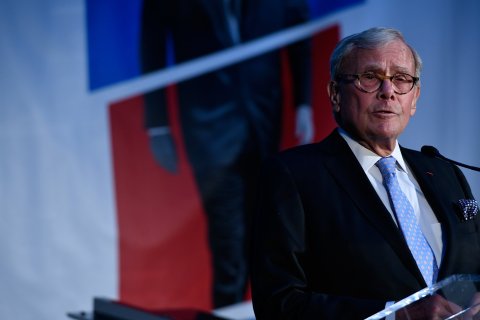
Do you think Trump's election opened the floodgates to this new era in which celebrities are thinking, "Hey! I can run for president now"?
I think it did. [But] not every celebrity can do it. You've read interviews with The Rock talking about running for president. He's clearly never thought deeply about politics in his life. To be an effective celebrity candidate, you have to have a fully formed political ideology. A lot of people say that Trump didn't. I'm going to say that Trump did. Trump's views on trade policy, for instance, go all the way back to the '70s.
How would you characterize Oprah's ideology? Obviously she wouldn't be able to tap into the leftist anger that Bernie Sanders did.
My sense is she's a pretty conventional liberal; probably similar on policy to Barack Obama or Hillary Clinton. One thing that's interesting that I haven't seen from her before is her complete embrace of the #MeToo movement. In many ways, that puts her in the same lane as someone like Kirsten Gillibrand.
Related: Why Oprah was the ultimate winner of the 2018 Golden Globes
One other celebrity who has been mentioned as a potential candidate is Mark Zuckerberg. Does he have any charisma whatsoever?
He has the resources to mount a serious campaign. He's a billionaire. Any billionaire has to be taken seriously, as we learned from Ross Perot in the 1990s. The other thing about Zuckerberg: While he may or may not have any personal charisma, he does not have any sort of a charismatic following at this time. Interest in him comes from admiration of his business skills, but not necessarily a charismatic relationship with him or with his policies. I think he has the potential to be a candidate at some time, but he has a lot of work to do. I think he could run sometime in the future, but not in 2020.
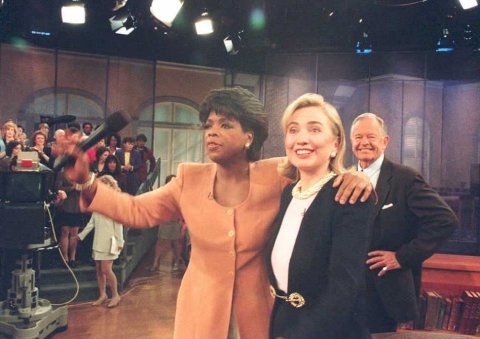
If you had to take a guess, do you think Oprah really will run in 2020?
I think Oprah would only run if she felt she could win and if she felt she was needed. Right now President Trump is not polling very well, so it looks like a conventional candidate can defeat him.
How has living through one year of a Trump presidency complicated your research on charisma?
I don't think people's concerns about Trump—concerns that I share—mean that charisma is inherently dangerous. We knew charisma could be used for troubling ideas before Trump came along because Adolf Hitler used it that way. Charisma can also be used in the way that Martin Luther King used it: to rally support around an important issue that will help millions of people.
Who is the least charismatic presidential candidate of your lifetime?
I don't remember Michael Dukakis very well. It might be him. I would say Michael Dukakis, Bob Dole, Mitt Romney and John Kerry were all versions of uncharismatic. Romney got better over time. I think there's a real possibility, though not necessarily a likelihood, that people could get tired of charisma after Donald Trump and turn to someone like John Kasich, who was dull as dishwater.


